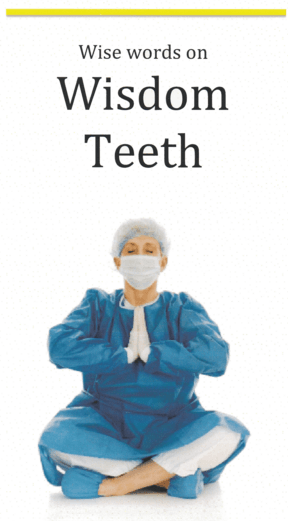
Wisdom Teeth
95% of Singaporeans need to have their wisdom teeth removed.
Wisdom teeth appear in the mouth at about 18 years of age. they are called Wisdom teeth because they erupt at a time when the person has started to come of age, and is wiser. (We all know people who are none-the-wiser for their wisdom teeth, but the name has stuck with these teeth!).
Wisom teeth are usually impacted, or "jammed" behind the second molars of the mouth because there isn't enough space in the jawbone to accomodate them.
Impacted wisdom teeth can come in many forms, and the difficulty of the surgery depends on factors such as the depth of the tooth, the angle of impaction, the number and shape of the roots, the proximity to important structures, the ease of access to the area, the personality of the patient, the training of the dentist, and so on.
Historically, some dentists have advised patients with deep impactions not to remove the wisdom teeth, because they lack the confidence to do so. Nowadays, there are trained specialists in wisdom teeth removal.
Leaving an impacted wisdom tooth in place has many risks, depending on the tyoe of impaction. The most common problem is recurrent pericoronitis, which is a swelling of the gums covering the partially-embedded tooth; this is caused by an infection, and is commonly misdiagnosed by laymen as "erupting wisdom tooth pain" and dismissed to their peril.
Sometimes, the impacted tooth causes food to collect in the crevice between the tooth and the tooth in front, and decay forms deep down the back edge of the tooth in front that is difficult or impossible to fill, and both teeth are lost instead of just the third molar. We all love discounts, but "two for the price of one" in this situation is not a good deal.
Most wisdom teeth are removed routinely under local anaesthesia in the dental office, but for some people, removal under general anaesthesia is required.
